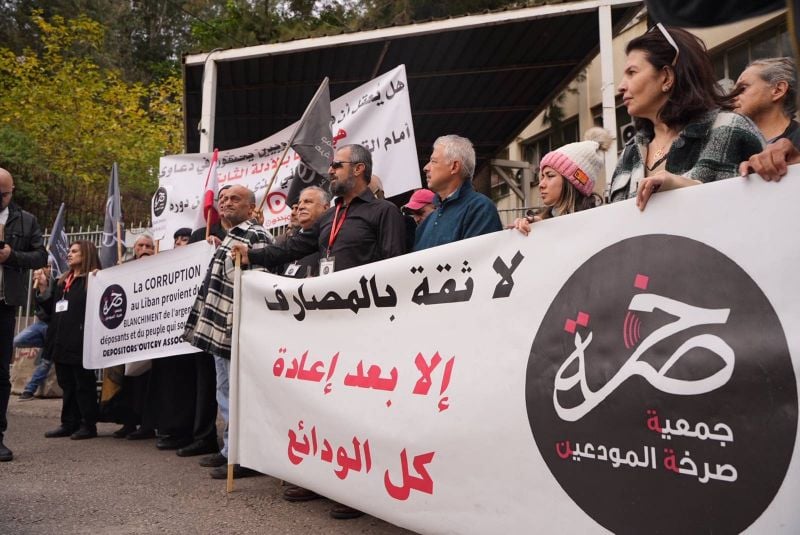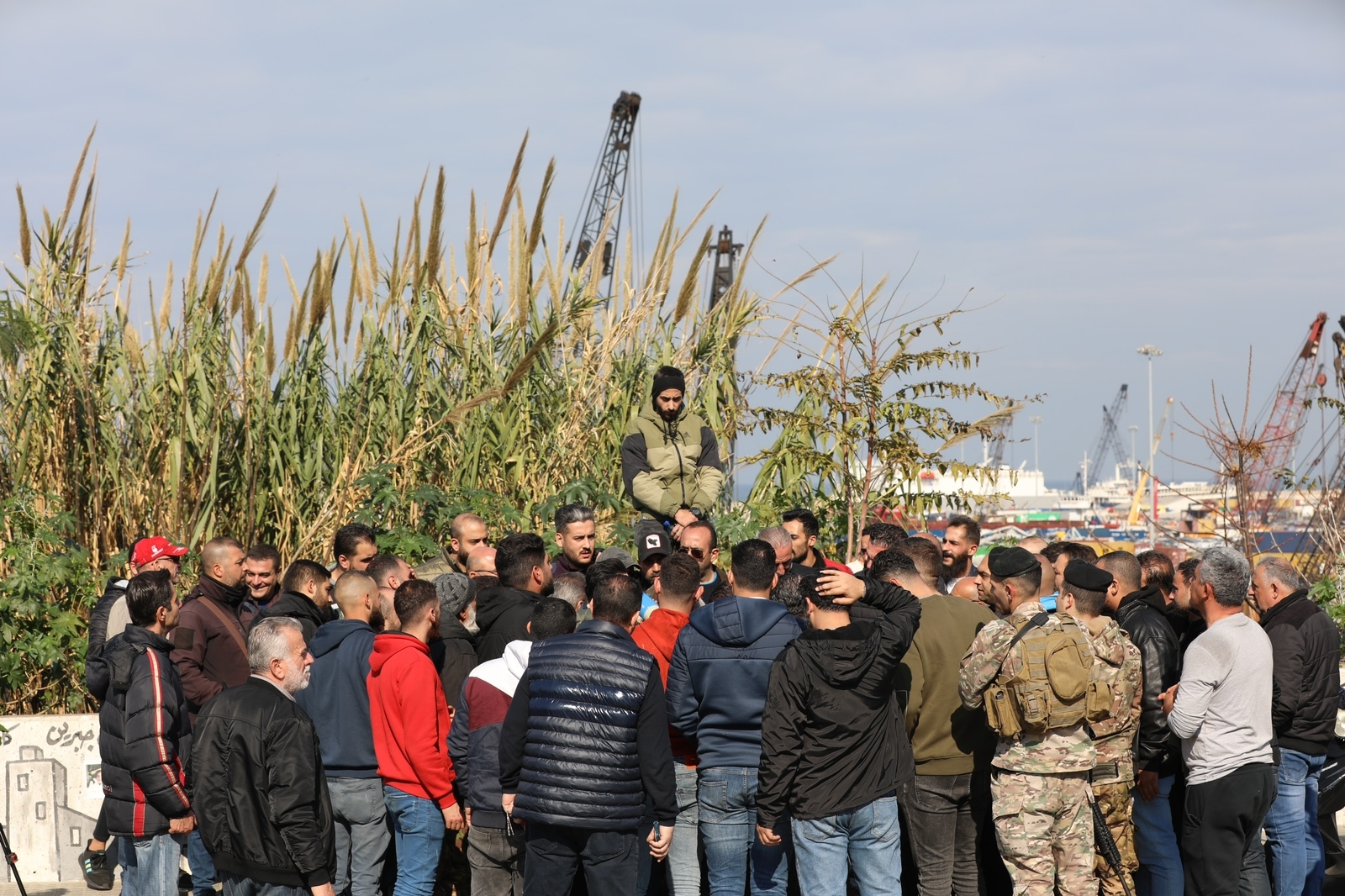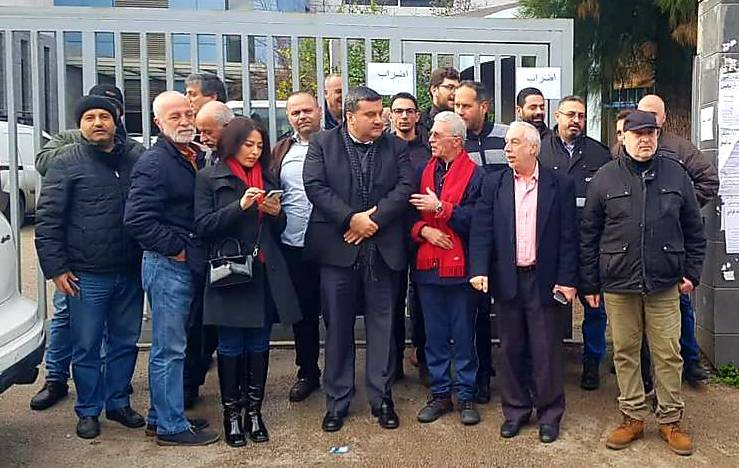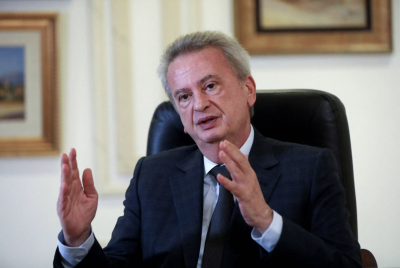
Depositors stage a sit-in in front of Beirut Justice Palace, Jan. 17, 2023. (Credit: Mohammad Yassine/L'Orient Today)
BEIRUT — From north to south, Lebanon experienced several protests across multiple sectors on Tuesday.
Depositors called for progress in the investigations into central bank governor Riad Salameh, the telecoms sector held a strike to demand settled salaries and car importers demanded further adjustments to the newly raised customs tariffs.
'Give us back our dough, you scums!'
In Beirut, depositors' rights groups held a sit-in in front of Beirut's Justice Palace during a visit by European judges to investigate alleged corruption and money laundering by Banque du Liban governor Riad Salameh, L'Orient Today's correspondent on the scene reported.
Investigators from France, Germany and Luxembourg held their first day of hearings on Monday in Beirut. Depositors' rights collectives Mouttahidoun ("United") and The Depositors' Cry called for the protest the previous day.
About a hundred protesters gathered at the Justice Palace on Tuesday, amid a peaceful atmosphere.
"Bankers, Salameh! Give us back our dough, scum!" a protester shouted. "We have come to make our voice heard by European judges," said another. "Lebanon is stolen by a clique," he added.
French, German and Luxembourg judges are in Beirut to interview Riad Salameh and his brother Raja, as well as CEOs and other bank officials. Investigators are due to interview other banking officials on Tuesday, but the governor of the BDL is not on the list of those summoned, according to a judicial official who spoke to AFP.
'Our sector is suffocating'
In front of Beirut's port, scores of union members representing the second-hand vehicle sector organized a sit-in, causing heavy traffic in the area amid a relatively large presence of anti-riot police and army members, L'Orient Today's correspondent reported.
 Union members representing the second-hand vehicle sector stage a sit-in in front of Beirut port on Jan. 17, 2023. (Credit: Matthieu Karam/L'Orient-Le Jour)
Union members representing the second-hand vehicle sector stage a sit-in in front of Beirut port on Jan. 17, 2023. (Credit: Matthieu Karam/L'Orient-Le Jour)
Protesters called for an adjustment of customs tariffs applied to used cars. The tariffs have been calculated since December using an exchange rate of LL15,000 to the US dollar, instead of the official dollar-to-lira peg of LL1,507.5.
Those gathered at the port demanded that the government calculate custom duties at the LL8,000 rate — or the so-called "lollar" rate, i.e. the rate at which commercial banks pay out dollar cheques — instead of LL15,000.
Local car importer George Zeiter told L'Orient Today that his sector has multiple demands.
"Our sector is suffocating in all aspects," Zeiter said. "The issue of the customs duties is illegal and not fair. They increased the customs tariffs to LL15,000 without adjusting [other] modalities accordingly because there is no cabinet," which must meet in order to take this kind of decision.
Unpaid salaries
Meanwhile, employees from the Telecommunications Ministry and Lebanese state-owned telecoms operator Ogero, across various parts of Lebanon, including Tripoli, Akkar and Saida, staged sit-ins to demand the Finance Ministry settle their outstanding salaries, L'Orient Today's correspondent reported.
In Halba, Akkar governorate, telecoms employees arrived at their jobs Tuesday morning only to close their sales offices and said they would refrain from any technical or administrative work, according to L'Orient Today's correspondent.
 Telecommunications Ministry employees staged a sit-in in Tripoli to demand the Finance Ministry settle their outstanding salaries, Jan. 17, 2023. (Courtesy of: Michel Hallak)
Telecommunications Ministry employees staged a sit-in in Tripoli to demand the Finance Ministry settle their outstanding salaries, Jan. 17, 2023. (Courtesy of: Michel Hallak)
In a statement released on Monday, the workers warned they would observe a strike "in protest against the Finance Ministry's withholding of their salaries for three months now, and to demand a quick solution to it."
The administrative head of the Public Sector Employees Association, Ibrahim Nahal, participated in the sit-in in Tripoli Tuesday, where he said the workers were "raising a cry and announcing a warning strike."
"We have closed all institutions, sales offices, etc. For three months, we have not received our salaries or supplementary [payments]," Nahal said, adding that the workers have not received their government-mandated transportation allowances "for six months."
This is not the first time employees of Lebanon's telecoms sector have gone on strike.
In early December, the country's cell phone operators, Alfa and Touch, held a strike demanding improved working conditions. In September, the same employees held an open strike demanding salary increases from the caretaker Telecoms Minister, before ending the strike with a sealed agreement. The details of this agreement were not provided to the press.
Additional reporting by Michel Hallak, Muntasser Abdallah and Matthieu Karam
